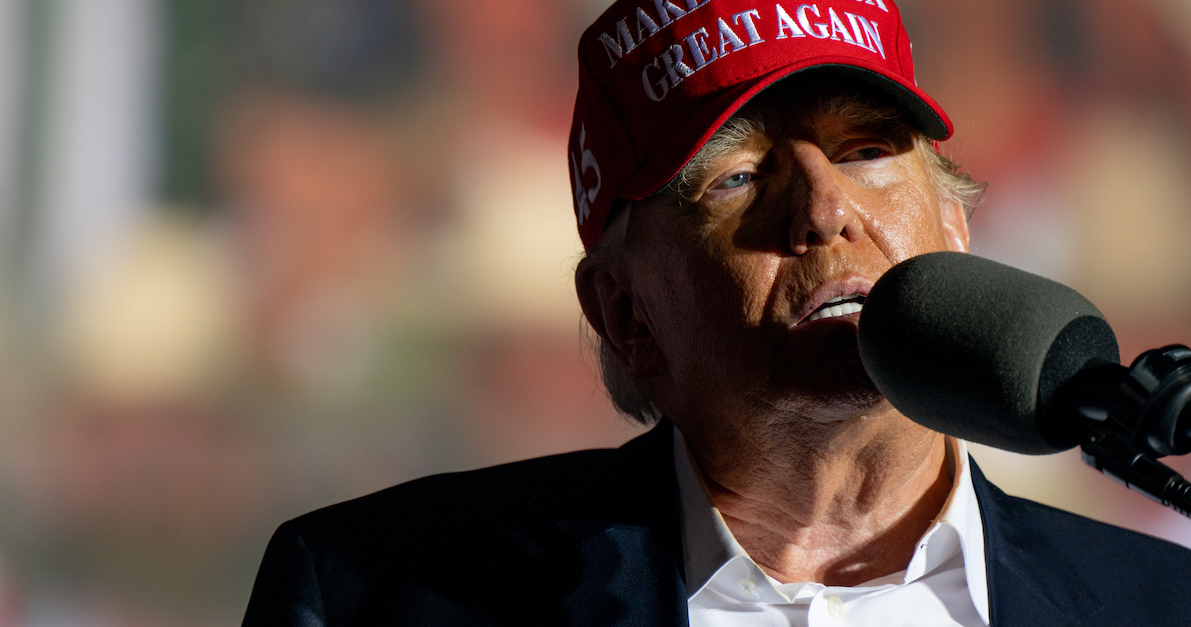
Former President Donald Trump speaks at a rally on Oct. 22, 2022 in Robstown, Texas. (Photo by Brandon Bell/Getty Images.)
After facing a brutal reception before the 11th Circuit Court of Appeals, attorneys for former President Donald Trump tried to salvage a lower court’s ruling gumming up the Department of Justice’s criminal investigation of records seized at Mar-a-Lago by pointing to the case of his lawyer Rudy Giuliani.
The 11th Circuit’s three-judge panel, comprised of two Trump appointees and a George W. Bush appointee, asked Trump whether a court ever asserted equitable jurisdiction to block the government from reviewing seized records pending review by a special master. Trump’s legal team claimed that the Giuliani case provided a precedent for that.
In a short but sharp reply on Thursday, special counsel Jack Smith replied that the comparison was inapt.
“That is incorrect,” the single-paragraph letter, signed by Smith and U.S. Attorney Juan Antonio Gonzalez, states in part.
In Giuliani’s case, the judge did not “enjoin the government” from reviewing records seized from the ex-New York City mayor’s apartment. Federal prosecutors themselves requested a special master because Giuliani’s status as a lawyer implicated attorney-client privilege concerns.
The government notes that is not the case with Trump.
“Moreover, the records there were seized from an attorney’s office, the review was conducted on a rolling basis, and the case did not involve a separate civil proceeding invoking a district court’s anomalous jurisdiction,” Smith’s letter states.
“None of those is true here” in the Trump case, Smith added.
Federal prosecutors ultimately declined to recommend charges against Giuliani, but the investigation of Trump continues. The search warrant indicated that authorities suspect possible violations of the Espionage Act, obstruction of justice and concealment and removal of government records.
As of press time, the 11th Circuit has not ruled on whether to allow the special master review currently pending before Senior U.S. District Judge Raymond Dearie to proceed. The three-judge panel appeared to leave little doubt earlier this week, however, that they believed U.S. District Judge Aileen Cannon’s rulings stood on shaky jurisdictional ground. Cannon’s ruling conceded that Trump did not prove a “callous disregard” for his rights by the FBI, and Trump’s attorneys agreed at the hearing that they had not proven that.
“If you can’t establish that, then what are we doing here?” Chief Judge William H. Pryor Jr., the sole George W. Bush appointee on the panel, bluntly asked Trump’s attorney James Trusty.
The two other members of the panel, U.S. Circuit Judges Elizabeth “Britt” Cagle Grant and Andrew L. Brasher, are Trump appointees who ruled against the former president before when they reversed portions of Cannon’s ruling related to classified materials. The FBI found more than 100 documents marked classified up to “Top Secret” and above in Mar-a-Lago, and Cannon initially ordered the government to stop scrutinizing them for their investigation until a special master reviewed them.
Federal prosecutors have continued investigating those materials ever since the 11th Circuit’s ruling in September, and now, they are hoping the court will allow them unfettered access to the tens of thousands of other files without classification markings.